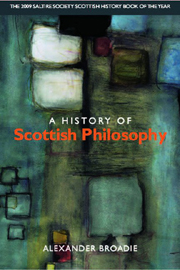Book contents
- Frontmatter
- Contents
- Acknowledgements
- 1 Introduction
- 2 John Duns Scotus
- 3 The Fifteenth Century
- 4 The Circle of John Mair
- 5 Humanism and After
- 6 Scotland Moves into the Age of Enlightenment
- 7 David Hume
- 8 Adam Smith
- 9 The Scottish School of Common Sense Philosophy
- 10 The Nineteenth Century: Ferrier to Seth
- 11 Realism and Idealism: Some Twentieth-century Narratives
- 12 Conclusion
- Bibliography
- Index
7 - David Hume
Published online by Cambridge University Press: 12 September 2012
- Frontmatter
- Contents
- Acknowledgements
- 1 Introduction
- 2 John Duns Scotus
- 3 The Fifteenth Century
- 4 The Circle of John Mair
- 5 Humanism and After
- 6 Scotland Moves into the Age of Enlightenment
- 7 David Hume
- 8 Adam Smith
- 9 The Scottish School of Common Sense Philosophy
- 10 The Nineteenth Century: Ferrier to Seth
- 11 Realism and Idealism: Some Twentieth-century Narratives
- 12 Conclusion
- Bibliography
- Index
Summary
Section 1: A Portrait of Hume
David Hume was born in Edinburgh on 26 April 1711. He came, as he reports, ‘of a good family, both by father and mother’. His father was a kinsman of the Earl of Home and his mother was the daughter of Sir David Falconer, president of the College of Justice. David was two years old when his father died. Thereafter he and his elder brother John and elder sister Katherine were raised by their mother partly at the family estate, Ninewells, near Chirnside in the Scottish Borders, and partly in Edinburgh.
Hume's studies at Edinburgh University probably began at the start of the 1721–2 session. It is likely that in his first year he studied Latin, proceeding in his second year to Greek, in his third to logic and metaphysics and in his fourth to natural philosophy. His third-year lectures are thought to have included a form of Calvinist scholasticism, while in the fourth year Hume was exposed to Robert Boyle's experimental physics and Newtonian mechanics, optics and astronomy.
Hume left the university in 1725. He did not graduate but did continue his intensive reading of both the classics and philosophy. In a letter to a physician he reported a consequence of this industry:
After much Study, & Reflection on this, at last, when I was about 18 Years of Age, there seem'd to be open'd up to me a new Scene of Thought, which transported me beyond Measure, & made me, with an Ardor natural to young men, throw up every other Pleasure or Business to apply entirely to it. The Law, which was the Business I design’d to follow, appear’d nauseous to me, & I cou’d think of no other way of pushing my Fortune in the World, but that of a Scholar & Philosopher.
- Type
- Chapter
- Information
- A History of Scottish Philosophy , pp. 147 - 195Publisher: Edinburgh University PressPrint publication year: 2008



